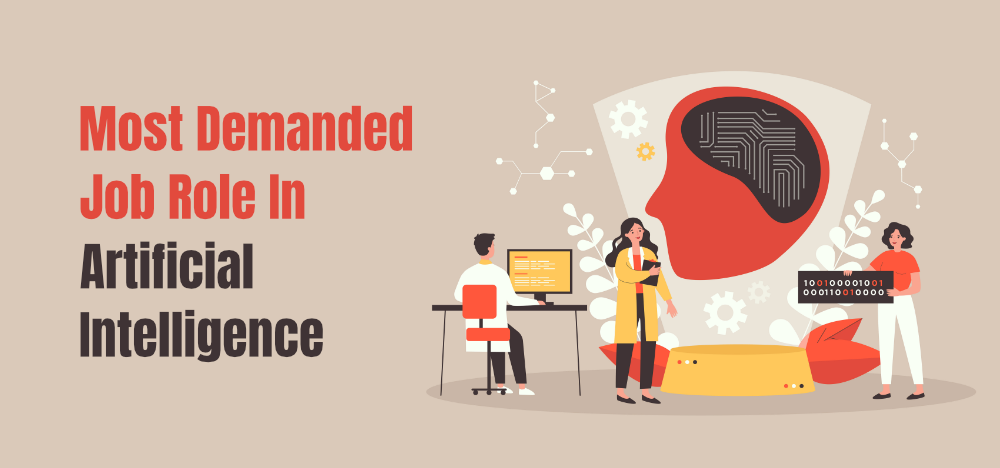
The job prospects in Artificial Intelligence (AI) are exceptionally promising, driven by the rapid adoption of AI technologies across industries and the increasing need for innovation in automation, data analysis, and decision-making. AI professionals are in high demand, with opportunities spanning research, development, deployment, and maintenance of AI systems.
1. Increasing Demand for AI Expertise
- Adoption Across Industries: AI is being integrated into healthcare, finance, retail, education, and more.
- Data Explosion: Organizations need AI to process and make sense of vast amounts of data.
- Automation and Efficiency: AI-powered tools improve efficiency, reduce costs, and enable smarter decision-making.
The AI job market is expected to grow significantly, with roles projected to increase by over 30% in the next decade according to market analyses.
2. Key Roles in AI
- AI/ML Engineer: Developing algorithms and models to solve specific problems.
- Data Scientist: Using AI to analyze and interpret complex data.
- Robotics Engineer: Designing intelligent robotic systems for various applications.
- Computer Vision Engineer: Building systems that interpret and process visual data.
- Natural Language Processing (NLP) Specialist: Creating systems for language understanding and generation.
- AI Research Scientist: Exploring cutting-edge AI techniques and theoretical advancements.
- AI Product Manager: Overseeing the development and deployment of AI-driven products.
3. Industries Hiring AI Professionals
- Technology: AI-driven software, autonomous systems, and cloud services.
- Healthcare: Predictive diagnostics, personalized medicine, and medical imaging.
- Finance: Fraud detection, algorithmic trading, and risk management.
- Retail and E-commerce: Recommendation engines, demand forecasting, and inventory management.
- Manufacturing: Smart factories and predictive maintenance.
- Transportation: Autonomous vehicles and logistics optimization.
- Education: Adaptive learning systems and AI tutors.
- Energy: Optimizing energy usage and developing renewable energy solutions.
4. Skills in Demand for AI Jobs
- Programming Languages: Python, R, Java, C++, and Julia.
- AI/ML Frameworks: TensorFlow, PyTorch, Keras, Scikit-learn.
- Data Analysis Tools: Pandas, NumPy, and Apache Spark.
- Cloud Computing: Experience with AWS, Azure, or Google Cloud AI services.
- Mathematics and Statistics: Linear algebra, calculus, probability, and statistical modeling.
- Big Data Technologies: Hadoop, Kafka, and Elasticsearch.
- AI Ethics and Bias Mitigation: Understanding the ethical implications of AI.
5. Certifications and Education
- Popular AI Certifications:
- Google AI/ML Professional Certificate.
- Microsoft AI Engineer Associate.
- IBM AI Engineering Professional Certificate.
- AWS Certified Machine Learning – Specialty.
- Formal Education: Degrees in Computer Science, AI, Data Science, or related fields.
- Online Learning Platforms: Coursera, edX, Udemy, and others offer specialized AI courses.
6. Emerging Trends in AI Job Prospects
- Generative AI: Tools like ChatGPT and DALL·E have created demand for developers who can build or enhance generative AI systems.
- Edge AI: Developing AI models that operate on devices rather than centralized servers.
- Explainable AI (XAI): Building AI systems that offer transparency and interpretability.
- AI in Sustainability: Optimizing resources and combating climate change with AI solutions.
- AI Regulation Compliance: As governments impose regulations, demand for professionals ensuring compliance grows.
7. Salary Expectations
- Entry-Level AI Engineer: $80,000–$110,000/year.
- Mid-Level AI Specialist: $110,000–$150,000/year.
- Senior AI Researcher: $150,000–$250,000/year or more.
- AI Leadership Roles: CTO or Head of AI can earn $250,000+/year.
8. Challenges in AI Careers
- Skill Gap: Rapid advancements in AI require continuous learning.
- Ethical Concerns: Navigating issues like AI bias, job displacement, and privacy.
- Data Privacy Laws: Adapting AI systems to comply with laws like GDPR and CCPA.
9. Preparing for a Career in AI
- Build Projects: Hands-on experience with real-world datasets and problems.
- Network: Join AI-focused communities (e.g., Kaggle, GitHub, or AI meetups).
- Research Contributions: Publish papers or participate in AI competitions like Kaggle or Google AI Challenges.
- Internships: Gain experience with tech companies or research labs.
10. Long-Term Outlook
The field of AI is poised for continuous growth as industries adopt advanced technologies. In the future, AI professionals may specialize further in areas like quantum AI, emotional AI, or general AI systems.
The combination of high demand, lucrative salaries, and opportunities to work on cutting-edge technology makes AI careers among the most exciting and rewarding in today’s job market.




